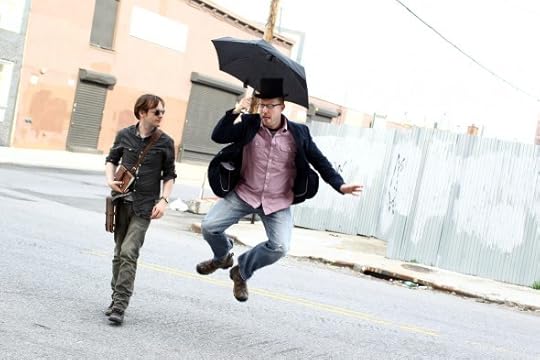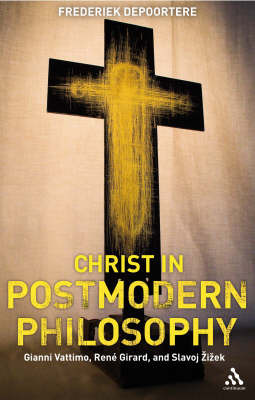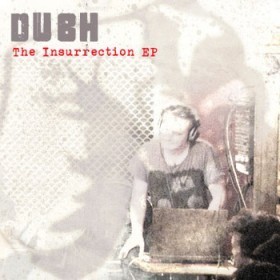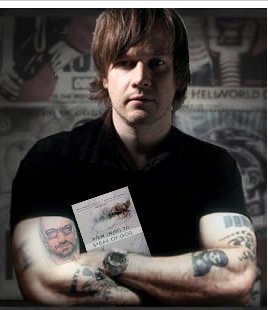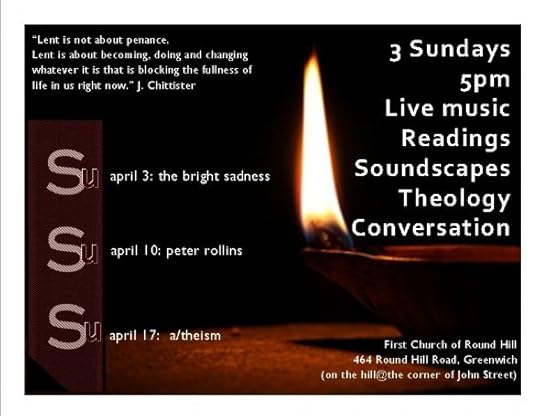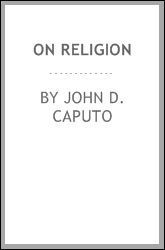Peter Rollins's Blog, page 55
April 26, 2011
The Real and the Resurrection
On Easter Sunday Tony Jones and me had a conversation that touched on the meaning of Resurrection at Revolution. We chatted a little about our concerns with the standard Liberal and Conservative renderings of this event and reflected on the theological significance of the different descriptions of Resurrection found in the New Testament. While there is some substantial agreement between us there are also some interesting differences.
April 25, 2011
The Real and the Resurrection
On Easter Sunday Tony Jones and me had a conversation that touched on the meaning of Resurrection at Revolution. We chatted a little about our concerns with the standard Liberal and Conservative renderings of this event and reflected on the theological significance of the different descriptions of Resurrection found in the New Testament. While there is some substantial agreement between us there are also some interesting differences.
On a different note I am traveling to Princton Seminary today to see Tony offer an oral defensive of his PhD dissertation. If all goes well he will, by the end of the day, be a doctor.
Christ in Postmodern Philosophy
This is a wonderful and rewarding book by Frederiek Depoortere that explores three different philosophers working today who have something significant to say about Christ. I found the chapter on Zizek's Christology particularly insightful.
I should mention that the title of the book is a little misleading as some of these thinkers could not really be described as postmodern.
For those not schooled in philosophy the book might prove challenging at times, but like any good book the work you put into reading it will be richly rewarded.
To buy it click here
April 23, 2011
You are not free, but you will embrace your slavery as if it were freedom
The philosopher Slavoj Zizek once compared a parent saying to a child, "I don't care what you want, you are going to visit Granny", with them saying, "You don't have to see Granny, but she is lonely, sad and really wants to see you".
Today parents are often told that they should use the later technique rather than the former one (one can perceive much about a cultures ideology by looking at how they are taught to address children). Traditionally a child would be told to get in the car whether they liked it or not, but today, parents are counseled to reason with their children and convince them to accept what they are being told.
For most "enlightened" parents today the second approach would seem preferable to the first. Yet perhaps the second approach is actually more oppressive to the child. Let us rewrite the two statements as follows,
1. You may not subjectively (internally) want to go to see Granny but you are objectively (actually) going to do it
2. You should not only objectively (actually) go and see Granny, but you should subjectively (internally) want to
In other words the former statement forces the child to go and see Granny while allowing them to internally protest the event. They may have to go, but they don't have to like it. In contrast the later not only forces them to go (after all the parents will just increase the level of guilt until they do, and if that doesn't work they will resort to the first technique) but demands that they feel it as something they want to do. Here the parents seek to take away, not only their ability to objectively rebel, but also their ability to internally rebel against what they are powerless to prevent.
Here we glimpse how ideology functions. It not only causes us to materially engage in certain practices that may hurt us, but demands that we accept those practices as true, good, and natural. The basic logic of ideology is – you are not free, but you will embrace your slavery as if it were freedom.
Is this not how we should understand the event that happened during the Cold War when journalists from the US and USSR swopped places for a time in a cultural exchange program? In America the journalists from the USSR were shown around some of the largest media outlets in the US and got to chat with many of the people responsible for writing and disseminating the news.
It is said that the journalists from the USSR looked very confused by much of what they saw and, at the end of their exchange, were asked why they seemed so baffled.
"Well", said one of the journalists, "back home we uphold the ruling ideology because, if we don't, our lives, and the lives of those we love, will be put at risk. But here you uphold the ruling ideology, not because you have to in order to survive, but because you genuinely seem to believe it".
April 12, 2011
Insurrection EP (Music)
The Insurrection was created in the direct aftermath of the 2010 Insurrection Pub Tour. This EP captures the dark, brooding atmosphere of the tour through its sublime mix of ambient soundscapes, dubstep beats, glitches, and samples.
You can download the EP here or get it as part of the Insurrection iphone app here
April 11, 2011
Greenbelt, UK
April 10, 2011
Finally! The identity of RealPeteRollins revealed
Some of you may know that around 6 months ago a twitter account started up called 'RealPeteRollins'. This was then followed up with a facebook page a few months later. Since that time I often get asked the question, "who is this RealPeteRollins". Well my guess is as good as anyone's, but I do have my suspicions… and if I am honest I think it might be me.
I have no way to prove it of course but there are hints. For example, recently I wrote the following message,
I am trying to think of the main conferences, festivals, Universities and Seminaries that I should try and target. Places that would help to get the message out. Trying to think of the main ones only… any suggestions?
Shortly after RealPeteRollins wrote,
Trying to think of conferences festivals Universities & Seminaries I should target. Places where I would sell most books. No time wasters
I don't know about you, but the first message strikes me as deeply disingenuous. It seems to be a mask that hides a more insidious truth… a truth that is perhaps revealed by the RealPeteRollins. Now, as you might expect, I very much protest RealPeteRollins' intepretation of my words. IN NO WAY did I mean what he implied. But then again I would say that as it is obvious that my twitter, facebook, and website, are mere propaganda machines that pretend to offer you an insight into me while ensuring I remain hidden behind an idealized image. I hide myself in my public profile while the womaniser, Buckfast drinker and chat roulette master RealPeteRollins courageously speaks (occasionally) my truth.
As such I sometimes get the feeling that there is more 'me' in the RealPeteRollins twitter and facebook accounts than in my own and thus perhaps, if you would like to know me better, you will find more insight there (not to mention the more recent addition to this entangled world - rip0ff_ikon).
April 9, 2011
Orthodox Heresy for Lent, CT
April 5, 2011
On Religion
It's conventional wisdom not to bring up religion in casual conversation. The subject tends to polarize people into believers and skeptics. While one camp adduces little more than personal experience in support of their claims, the other is unwilling to admit much beyond the revelations of science. Neither is a satisfactory alternative for Caputo, who infuses his meditations in On Religion with ambiguity, uncertainty, and hopefulness. Caputo's book is not the fodder of tired collegiate debates. That is, it is neither a defense of religious belief nor a proof that God is not possible. It is a slender volume that is full of insights.
It's no wonder Caputo has carved out a niche for himself as one of the most sincere and thoughtful writers in today's continental philosophy. Among elitist thinkers who seem to pride themselves on jargon and labyrinthine writing, Caputo is a refreshing complement, refusing to believe that intellectual substance is at odds with clarity.
April 4, 2011
Take this cup of suffering from me
Human beings are animals who affirm purpose. Throughout history people have believed that the world is fundamentally meaningful, even in the face of the most horrific violence and chaos. When individuals or groups threaten to destroy what a culture takes to be meaningful they are judged and dealt with in a variety of means (educated, shown mercy, arrested, tortured, killed etc.).
Church theology has traditionally been one of the primary means in which the structure of meaning has been maintained and promoted. It generally legitimates the system of meaning affirmed by a given culture and models its own theological terms in light of the societies norms (the dominant readings of the Crucifixion, for example, have always modelled the political arrangements of the culture they were conceived in rather than confronting them).
Because of this we naturally tend to think of the chaos brought about by suffering as originating from the outside, as an external force that threatens our ability to see, embrace or participate in meaning. It is disease, accidents, the devil, sin and/or human action that prevent us from fully achieving the happiness and fulfilment of a life in line with the natural order. In short, an obstacle threatens our ability to participate in a full, joyful and meaningful life.
From this perspective the religious community has generally believed that "God" has come to set us free from this external obstacle. They have dedicated vast amounts of time and effort to developing theologies that tell us Christ wants us to be freed from suffering, that God is the ultimate source of meaning and that the Spirit gives us security and stability. For when suffering is thought of as originating from an external source then "God" is understood as the one who can free us from that obstacle.
This is why the Passion of the Christ (his full and undiluted embrace of suffering) is so offensive to the Church and Society. For in the Passion Christ does not banish suffering but totally embraces it. This can only be understood when we acknowledge that pain is not simply something that imposes itself upon our life but is, more fundamentally, part of life. In other words, the various possible external threats to our participation in meaning are undermined by the very real internal threat of the dread that there might be no meaning. If this is the case then we cannot avoid this suffering but must face it.
The danger that we might fall short of participation in a meaningful life because of illness, depression, sin, the devil, ignorance etc. does not therefore get at the most fundamental type of suffering: for there is a suffering that arises from the experience of life itself. The experience of this suffering is called anxiety and is manifest in the feeling of dread at the apparent emptiness of existence. It is a dread we strive to avoid at all costs (through church participation, political action, entertainment etc.). Which is what Kierkegaard was hinting at when he said that thinking doesn't make you depressed but reveals that you always were depressed but simply didn't know it.
By avoiding this insight the Passion makes no sense at all (at least until we tie it to the procrustean bed of liberal or conservative apologetics). It confronts us as an offense.
We see suffering as something that comes to us from the outside and therefore as something that we can protect ourselves from through medication, surgery, prayer, entertainment, worship, relationships etc. But even when we are able to protect ourselves from the suffering that comes from without we cannot protect ourselves from the suffering that bubbles silently within. We may repress it, ignore it, shout at it, bargain with it, but we cannot banish it.
It makes no sense to embrace the Passion. It strikes us as absurd to stare at our own suffering and embrace our angst. It is offensive to think that the way of salvation might involve acknowledging the inescapable nature of pain. We are enraged by the thought that this suffering is part of us, is real, is eating away at our humanity and must be brought to light. The idea that we must open ourselves up to this sickness, feel ourselves overcome by its tidal force, and embrace the devastation of this threat is infuriating.
This can't be the path to freedom… this can't be the road to liberation… this can't be the way into new life… and in no way can this be Christianity…
It is natural for us to feel this and it is natural for us to want our cup of suffering taken away, but in the Passion we glimpse the possibility that life might only be found when we grip it in both hands and gulp it down…
Peter Rollins's Blog
- Peter Rollins's profile
- 314 followers


